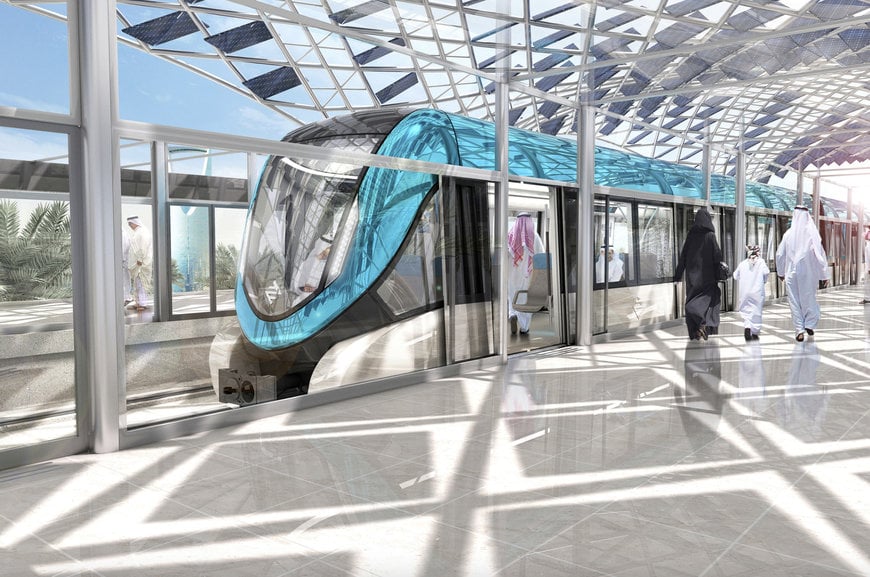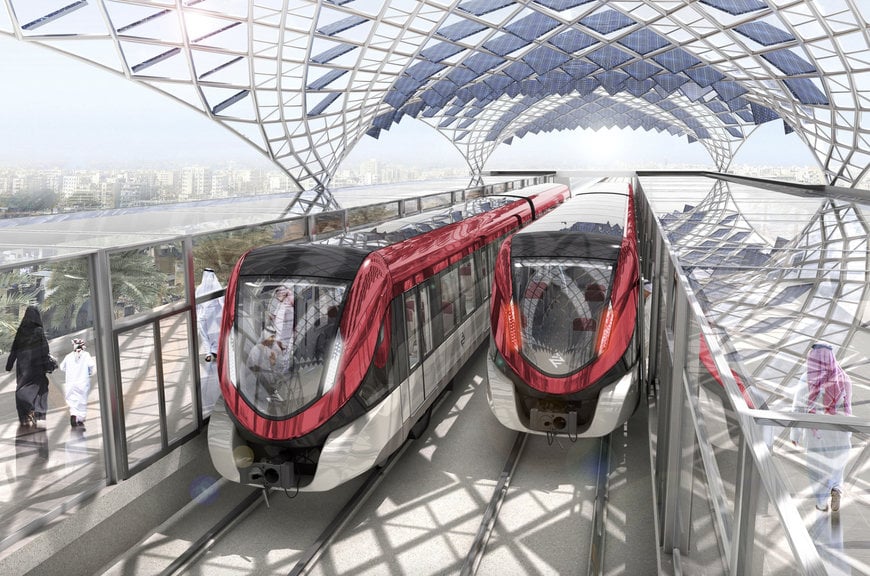railway-international.com
29
'24
Written on Modified on
Transforming Public Transportation in Saudi Arabia
BACS consortium with Siemens Mobility successfully completes Riyadh’s Blue and Red metro lines.
www.siemens.com

Metro Riyadh: Automated, driverless metro trains, photo source: Siemens Mobility
The BACS consortium led by Bechtel, along with local construction companies Almabani and Consolidated Contractors Company, and in collaboration with Siemens Mobility, successfully delivered Riyadh Metro’s 64-kilometer Blue Line (line 1) and Red Line (line 2), equipped with 67 Siemens Mobility Inspiro trains for fully automated, driverless operations. This marks a significant achievement in the development of public transportation in the capital city, providing residents and visitors with a fast, safe, and eco-friendly mass transit system. The passenger operations on the network’s Blue Line starts December 1st with Red Line officially commence passenger operations on December 15.
This state-of-the-art transportation system not only meets Riyadh’s present transportation needs but also supports the increasing mobility demands as Saudi Arabia prepares to co-host the 2027 AFC Asian Cup, welcome the World Expo 2030, host the 2034 Asian Games, and bid for the FIFA World Cup 2034. Construction for the project started in 2013.
Riyadh’s impressive mass transit project consists of six metro lines spanning a total of 176 kilometers, alongside a fleet of 842 buses covering 1,900 kilometers of route length. Siemens Mobility has played a crucial role in this development not only by delivering 67 Inspiro trains but also by equipping the Blue Line and Red Line with the latest version of the Communications-based Train Control System [CBTC]. In addition to its involvement in the metro project, Siemens Mobility has secured a separate service contract from the Capital Metro Company [CAMCO], a joint venture between RATP Dev and SAPTCO, the operator of the Blue Line and the Red Line. This contract encompasses a mobilization phase, followed by the maintenance of all components and systems provided by Siemens Mobility, as well as the track infrastructure for an additional three years.

To support a growing population by 2030, the Saudi Arabian Government is implementing one of the world's largest public transport systems, photo source: Siemens Mobility
Metro Riyadh: Automated, driverless metro trains
The 41 four-car and 26 two-car driverless trains of the "Riyadh Metro" type, based on the Siemens Mobility Inspiro platform, are engineered for the region’s specific climatic conditions. A larger and more powerful air conditioning system ensures pleasant climate conditions in the passenger compartment. Additionally, filters and sealing systems reduce the ingress of sand into the areas such as air conditioning, traction systems, brakes, and bogies. Another notable technical feature is the ability to couple and decouple trains automatically. This allows the operator to remotely choose which trains need to be coupled or decoupled from the operations control center, enabling flexible train lengths based on demand. The Inspiro trains offer comprehensive passenger information for announcements and multimedia information to enhance travel experiences. The metros in Riyadh ensure optimized energy consumption, low maintenance costs, and high recyclability. The delivery of the driverless metro trains to Riyadh began in 2018, marking a significant milestone in implementing the Riyadh Public Transit System.
The BACS consortium led by Bechtel, along with local construction companies Almabani and Consolidated Contractors Company, and in collaboration with Siemens Mobility, successfully delivered Riyadh Metro’s 64-kilometer Blue Line (line 1) and Red Line (line 2), equipped with 67 Siemens Mobility Inspiro trains for fully automated, driverless operations. This marks a significant achievement in the development of public transportation in the capital city, providing residents and visitors with a fast, safe, and eco-friendly mass transit system. The passenger operations on the network’s Blue Line starts December 1st with Red Line officially commence passenger operations on December 15.
This state-of-the-art transportation system not only meets Riyadh’s present transportation needs but also supports the increasing mobility demands as Saudi Arabia prepares to co-host the 2027 AFC Asian Cup, welcome the World Expo 2030, host the 2034 Asian Games, and bid for the FIFA World Cup 2034. Construction for the project started in 2013.
Riyadh’s impressive mass transit project consists of six metro lines spanning a total of 176 kilometers, alongside a fleet of 842 buses covering 1,900 kilometers of route length. Siemens Mobility has played a crucial role in this development not only by delivering 67 Inspiro trains but also by equipping the Blue Line and Red Line with the latest version of the Communications-based Train Control System [CBTC]. In addition to its involvement in the metro project, Siemens Mobility has secured a separate service contract from the Capital Metro Company [CAMCO], a joint venture between RATP Dev and SAPTCO, the operator of the Blue Line and the Red Line. This contract encompasses a mobilization phase, followed by the maintenance of all components and systems provided by Siemens Mobility, as well as the track infrastructure for an additional three years.

To support a growing population by 2030, the Saudi Arabian Government is implementing one of the world's largest public transport systems, photo source: Siemens Mobility
Metro Riyadh: Automated, driverless metro trains
The 41 four-car and 26 two-car driverless trains of the "Riyadh Metro" type, based on the Siemens Mobility Inspiro platform, are engineered for the region’s specific climatic conditions. A larger and more powerful air conditioning system ensures pleasant climate conditions in the passenger compartment. Additionally, filters and sealing systems reduce the ingress of sand into the areas such as air conditioning, traction systems, brakes, and bogies. Another notable technical feature is the ability to couple and decouple trains automatically. This allows the operator to remotely choose which trains need to be coupled or decoupled from the operations control center, enabling flexible train lengths based on demand. The Inspiro trains offer comprehensive passenger information for announcements and multimedia information to enhance travel experiences. The metros in Riyadh ensure optimized energy consumption, low maintenance costs, and high recyclability. The delivery of the driverless metro trains to Riyadh began in 2018, marking a significant milestone in implementing the Riyadh Public Transit System.
www.siemens.com

